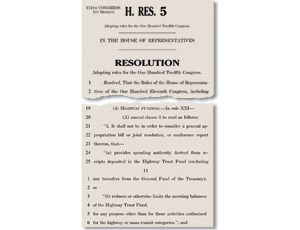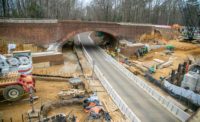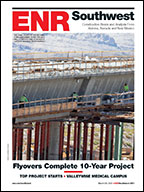The 112th Congress has not begun well at all for highway construction advocates.

On Jan. 5, the first day the new Congress was in session, the House, now under Republican control, approved a procedural rule that breaches a 13-year-old legislative “firewall” and lets House appropriators cut highway and transit spending below sums authorized in 2005’s Safe, Accountable, Flexible, Efficient Transportation Equity Act: a Legacy for Users.
“We are very distressed,” says Pam Whitted, vice president for government affairs for the National Stone, Sand and Gravel Association in Alexandria, Va. “We’re concerned because it puts highway funding in jeopardy.”
The first test of the highway-transit provision will come soon, when lawmakers draft a bill funding agencies through the rest of fiscal 2011. The deadline for that new spending measure is March 4, when a current stopgap expires.
House GOP leaders have made no secret about their desire to slice spending. Whitted says, “It’s clear that the Republican House is going to make cuts, and nothing is sacrosanct. Everything is on the table.”
Jack Basso, the American Association of State Highway and Transportation Officials’ director of program finance and management, says the House GOP has talked about $50 billion in total cuts to domestic programs. Defense and other “security” accounts would be spared.
Transportation industry officials worry the cuts could include the highway obligation ceiling, which has been funded since Oct. 1 at 2010’s annual rate of $41.7 billion. But it’s uncertain whether Republicans will impose an across-the-board cut on each account or set an overall $50-billion target and let appropriators set varying reductions on individual line items.
Cathy Connor, Parsons Brinckerhoff senior vice president for government affairs, says an across-the-board cut would have serious implications for transportation. But she adds, “If there’s some discretion in how the cuts are taken, I think that we can make a very good case in support of the need for maintaining transportation investment.”
The firewall was the keystone of the 1998 Transportation Equity Act for the 21st Century, whose chief architect, ironically, was a powerful Republican, Rep. Bud Shuster of Pennsylvania, the then-chairman of the Transportation and Infrastructure Committee.
Basso notes that, initially, the new House rule doesn’t impose any spending cuts. But he adds, “It certainly opens the door to returning to circumstances as they were pre-1998.” In those years, appropriations committees held the upper hand. Basso recalls they cut authorized highway funding, thus building the Highway Trust Fund balance, and shifted the money to other programs. Cuts could be “pretty big,” Basso says, noting that, in 1993, appropriators sliced highways’ $20-billion authorized level 22.5%, to $15.5 billion.
The new House rule has no direct effect on the Senate, which Democrats still control. Senate Environment and Public Works Committee Chairman Barbara Boxer (D-Calif.) is strongly on industry’s side. On Jan. 6 she told reporters, “I will fight to the end any efforts by the House to use these rules to reduce much-needed job-creating investments in our highways, our bridges and our transit systems.” Boxer’s panel has jurisdiction over highway authorizations.
Beyond the looming fight over 2011 funding, Basso expects the firewall issue to come to a head again when a new multiyear highway-transit reauthorization emerges. He also thinks that transportation groups will try to undo the new House rule during the debate over that not-yet-drafted measure.
Transportation groups pushed to drop or ease the House rule. They backed an amendment—offered in the closed Jan. 4 GOP meeting by Rep. Steven C. LaTourette (R-Ohio)—that would have retained the firewall. But that proposal was defeated.
American Highway Users Alliance CEO Greg Cohen calls the new House rule “a wake-up call” for transportation interests. He says that, given Capitol Hill opposition to a gas-tax hike, “we’re going to have to look at funding our program in a different way” in the new reauthorization bill.





Post a comment to this article
Report Abusive Comment